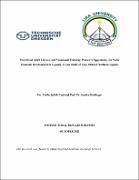| dc.description.abstract | The study was about women's opportunity for socio-economic development based on their experiences on Functional Adult Literacy (FAL) and integrated vocational training in Apac District-Northern Uganda. The main objective of this study was to explore whether and how women participants in Apac District derived socio-economic benefits from FAL as well as integrated vocational training. The study was informed by agency theory from Freire's literacy theory and Kabeer's socio-economic perspective which contend on the component of awareness or by making marginalised non-literate's agents of socio-economic development. These theories helped to explore and establish the socio-economic transformation experienced by women as a result of their participation in FAL in addition to integrated vocational training. These transformations were captured by comparing the kinds of life led by the women prior to and after FAL and integrated vocational training, in terms of participating in communities, family settings, awareness on the value of training and participating on income generating group projects. The study mainly used qualitative case study research design focusing on the experiences of 35 participants both in the rural and urban setting. Using Focused Group Discussions (FGDs) and key informant interviews, this study revealed the conditions of women before and after benefiting from FAL with integrated vocational skills. The findings of this study inductively generated from the participants revealed that women who acquired FAL in addition to integrated vocational skills significantly transformed their socio-economic lives. Opportunity for FAL and integrated vocational training improved women's daily lives in terms of confidence to participate in community undertakings and local council leadership. In addition, the women became self-employed, profited from income generating group projects, made re-investments of savings from the income generated. In turn, the well-being for themselves and their families greatly improved. Therefore, the study recommends that the Ministry of Gender, Labour and Social Development (MGLSD) which coordinates FAL training in Uganda along with other departments, such as international partners, NGO's and civil society organisations should prioritise, support and strengthen the FAL learning with integrated vocational training policies. [The research was funded by DAAD (German Academic Exchange Service).] | en_US |

